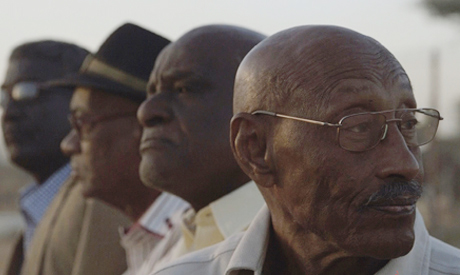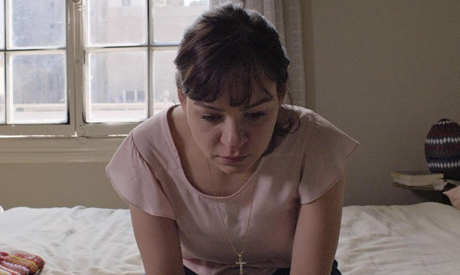This year wasn’t as good as the year before for Egyptian cinema. In 2018 there had been an Egyptian presence at prestigious film festivals around the world: Abu Bakr Shawky’s Yomeddine in the official competition of the Cannes Film Festival; Ahmed Fawzi Saleh’s Poisonous Roses premiering at the Rotterdam Film Festival; and the Egyptian-German documentary Dream Away by Marouan Omara; and Johanna Domke at the Berlinale.
In 2019 there were no Egyptian films at any of the five most important festivals (Cannes, Berlin, Venice, Rotterdam and Locarno).

Talking About Trees
In fact, fewer independent films were made this year. These included Lama Bentwelid (When we’re Born), an account of three different stories which is Tamer Ezzat’s second long narrative after The Ring Road (2010).
The script was written many years ago by the late screenwriter Nadine Shams, who died in 2014.
Since then Ezzat had been trying his best to gather the required funds to produce it. It premiered in the official selection out of competition at the third El Gouna Film Festival. Another production was Bi Elm Al-Wosool (Certified Mail) Hisham Saqr’s debut, which participated in the official competition of Carthage Film Festival and was screened at the Toronto Film Festival. The film is about a young mother whose husband is in jail.

When we’re Born
The dearth of productions was evident in the Egyptian film festivals’ desperation to select Egyptian films. The Cairo International Film Festival (CIFF) managed to include Marianne Khoury’s documentary Let’s Talk in the international competition. It was the first time for a documentary to be included among narrative films in CIFF but, recently, it has become almost a trend in most Class A festivals around the world not to make that distinction.
Khoury digs into her family heritage through intimate conversations with her daughter Sara Shazli. The film was screened at the International Documentary Film Festival IDFA in Amsterdam, and won the Youssef Cherif Rizkallah Audience Award at CIFF.
***
The year was rather more significant for film events with a general improvement in film festivals.
The 41st round of CIFF (dedicated to its former artistic director Youssef Cherif Rizkallah, who died last July) was impressive, and the third El Gouna Film Festival established it further as a major event in the region. In its eighth round, the Luxor African Film Festival lived up to its mandate of being a cultural event for Upper Egypt, while under film critic Essam Zakaria as president, the Ismailia Film Festival made a powerful impact as well.
***
Commercial cinema, on the other hand, continued with the same formulae, with fewer action films and more comedies. In 2019 there were numerous sequels, however: The Blue Elephant II, Sons of Rizq II, and The Treasure II.
Despite a weak plot and many tired clichés, Sherif Arafa’s top-grossing The Passage, with a script inspired by legendary special forces officers such as Ibrahim Al-Refaai who distinguished himself during the War of Attrition, made an unusually wide impact, with TV talk shows commenting on it and officials like the Kafr Al-Sheikh governor hosting free screenings of it.
Triggered by a low point in Egyptian history — the defeat of 1967, which leaves the protagonist, a colonel named Nour (Ahmed Ezz), deeply traumatised — the drama depicts the Egyptian military comeback. The subplots might have provided romantic and comic relief, but Arafa keeps them to a minimum focusing on the five battles at heart of the script. More important is the direction of the battle scenes, probably Arafa’s main target. It has been said that the production used a crew of technicians from the US and of course benefited from the support of the Armed Forces to shoot the battles, which are very well executed and edited.
***

Let's Talk
Both politically and culturally, 2019 was the year of Sudan: following the ouster of Omar Al-Bashir (who came to power by coup d’état in 1989) and his Islamist regime, Sudanese cinema was resurrected after three decades of near death.
The Sudanese documentary Talking About Trees directed by Suhaib Gasmelbari, which won the Berlinale’s Panorama audience award, the Tanit d’or at Carthage, and the best documentary feature at El Gouna, among others, deals with the dreadful situation of Sudanese cinema since 1989, when the regime began to shut down movie theatres. Gasemberli’s debut feature, the film is about the Sudan Film Group (SFG), an association formed by four senior Sudanese filmmakers — Ibrahim Shaddad, Al-Tayeb Mahdi, Suleiman Ibrahim and Manar Al-Hilo — in 1989. Screened before the revolution against Al-Bashir broke out, the film shows their attempts hold community film screenings. to start community activities of film screenings once again.
Amjad Abu Alala’s You Will Die at Twenty is another Sudanese film that stormed film festivals around the world. Produced by Egyptian producer Hossam Elwan, it won seven awards including Venice’s Lion of the Future, El Gouna’s Golden Star for best narrative film, and Carthage’s best screenplay award. The film tells the life story of a newborn who, while being blessed by the village sheikh after birth, is identified as someone who would die at 20.
A third significant Sudanese film was Marwa Zein’s documentary Khartoum Offside, which tells the story of the first female soccer team in Khartoum. It premiered at the forum section of the Berlinale and was screened at the Carthage Film Festival and in Arab Cinema Horizons competition of CIFF.
*A version of this article appears in print in the 26 December, 2019 edition of Al-Ahram Weekly.
Short link: